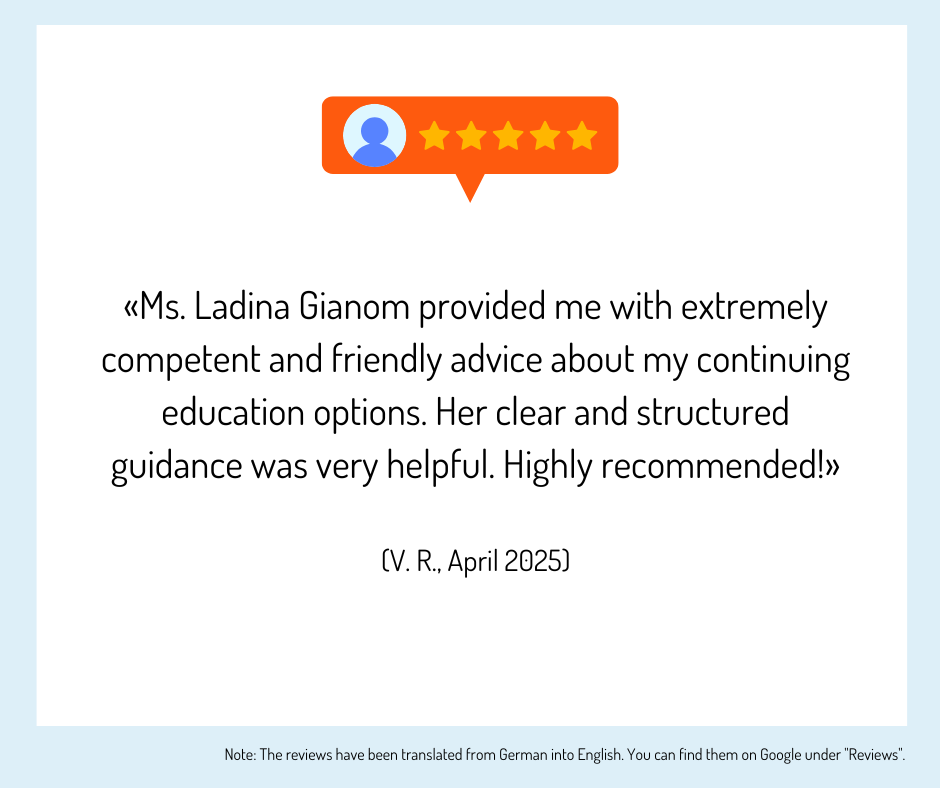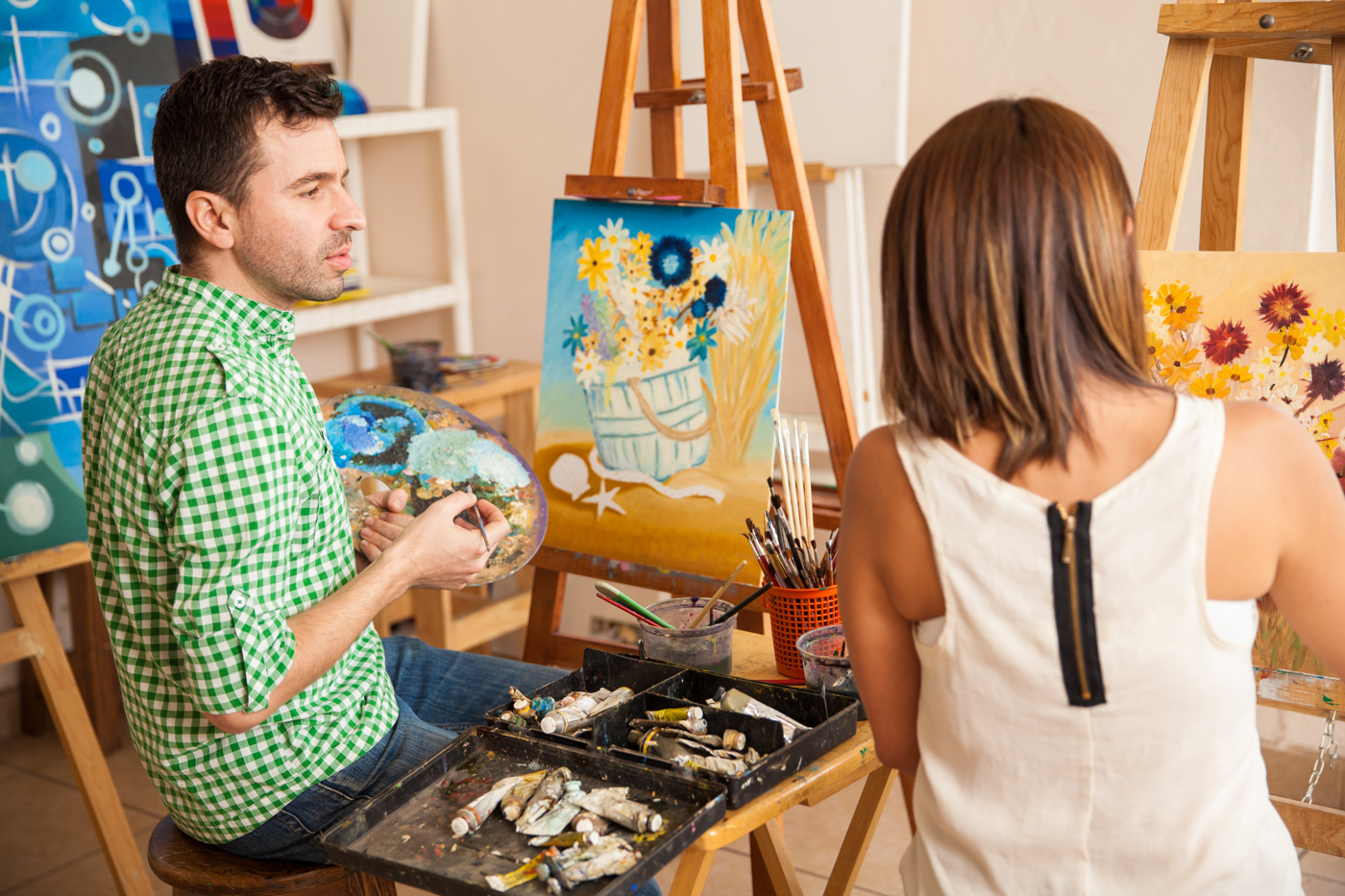Painting / Drawing / Illustrating (Region Zentralschweiz):
1 Provider
The following list shows you suitable providers:
Questions and answers
Painting course: Who is sure of their vocation?
A survey revealed the following certainty or uncertainty regarding one's own vocation:
- 40 % full security
- 44 % are more or less certain
- 16 % uncertainty
Before attending a painting course, it is worth making sure that painting really is your vocation.
Drawing course: What are the different drawing techniques?
Possible drawing techniques that are taught on a drawing course are:
- Figurative drawing
- Nude drawing
- From line to form
- Spatial drawing
- Drawing movement
- Drawing Modern Art
- Urban sketching
- Scribbling, sketching and illustrating
- Intuitive drawing
- Monochrome drawing
- Drawing with charcoal, red chalk and chalk
What different painting techniques are used in a painting course?
The painting courses involve experimenting with color and form. Participants create pictures or works of art using these different painting techniques and other techniques, for example:
- Coal
- Chalk
- Graphite
- Acrylic
- Gouache
- Watercolor
- Oil
- Sound
- Plaster
Painting course: What is the difference between painting and drawing?
The difference between painting and drawing is as follows: a drawing is generally an image made up of gray values. Painting, on the other hand, creates an image from surfaces. The painting tools used in a painting course are brushes of varying width that create surface-like lines or structures. A painted picture is usually in color.
What is taught in an acrylic painting course?
In an acrylic painting course, the techniques of acrylic painting are usually covered in a theoretical section. The basics of painting, such as picture composition and composition, are usually also taught in the course. However, an important part of every painting course is also the practical work, in which the techniques are demonstrated and applied step by step. Course participants experiment with acrylic paints, brushes, palette knives and other tools. In an acrylic painting course, participants are usually individually supported and guided by the course instructor in the realization of their ideas. In the acrylic painting course, the needs of the individual course participants can be addressed. It therefore plays a less important role whether a participant already has painting experience or experience in acrylic painting or is a beginner. The aim is to develop or expand painting skills and gain confidence with new techniques. The focus of these courses is on having fun with acrylic painting.
Painting course: What does it take to creatively realize picture ideas?
With the basic techniques learned in a painting course, you can create a picture step by step. The picture takes shape through composition, choice of motif, colors, surfaces and structures. By consciously using techniques and stylistic devices, the picture idea can finally be creatively implemented and finalized.
Who can attend a painting course for adults and why?
Anyone and everyone can paint. Fear of white paper is completely unfounded. With a little technique, even your own painting can become something very special. Because creativity and the desire for self-realization lies dormant in all of us.
A painting course for adults is aimed at people who want to learn or improve their painting skills as adults.
The scope of the course can range from a small taster course to a more extensive course. In a painting course for adults, a special painting technique or several painting techniques such as acrylic, watercolor or oil as well as mixed media or additional drawing techniques are usually taught. The basics of painting are also covered. Participants learn about different types of art such as representational, abstract or figurative. They learn how a picture is created step by step, how colors or shapes work and how a picture can be structured in a meaningful way.
In painting courses for adults, course participants learn how design elements can be combined with each other. Painting courses for adults provide a practical and theoretical insight into painting and thus into the cheerful world of colors. Course leaders pass on their tips and tricks in a painting course, which you can use when painting at home.
What different painting courses are offered in Switzerland and by whom?
There are painting courses in Switzerland on individual techniques (acrylic, watercolor, oil paint, chalk, drawing, etc.), geared to previous knowledge (for beginners, advanced, children) and even painting vacations or online painting courses. The length of the courses also varies - from a few days to semester courses. Painting courses in Switzerland are offered by artists, drawing teachers, art schools, painting schools, cultural associations, studios, publishers, public schools or adult education schools. In principle, however, any person can offer painting courses in Switzerland if they have the relevant expertise in painting and drawing. Many course instructors have an SVEB certificate in adult education, which confirms their skills for learning events with adults. This gives the customer the assurance that the proof of practice has been checked and that the basic knowledge in adult education has been imparted to this person. Compare the course content, the scope of the course, the costs, the instructors and the number of painting courses held in Switzerland well in advance. Information events or reviews from former course participants can also provide information about a good choice.
How does an online painting course work and does it exist?
The advantages of an online painting course are obvious: learning regardless of time and place. Participants decide for themselves when and for how long they want to learn. They can also decide where they want to learn best. In the great outdoors, in their own studio or even abroad. If you attend painting courses online, you can therefore count on a high degree of flexibility and self-determination. Painting in particular expresses feelings through colors and shapes. The corresponding feelings usually do not adhere to predetermined schedules and time slots. The materials are usually made available online and participants can interact with the course instructors and usually also with other course participants. This ensures the exchange of ideas in a group during an online painting course. Knowledge is often imparted in video lessons or tutorials. In some cases, this is supplemented with live video exchanges or other opportunities for exchange. Take advantage of the unbeatable benefits of online painting courses.
Mal Kurs: When was the last training course completed?
According to a survey on our education platform, the respondents' last training was so long ago (date of graduation):
- 17 % in less than one year
- 7 % in one year
- 14 % in two to four years
- 24 % in five to ten years
- 10 % in more than ten years
- 28 % have never done any further training
These answers also show approximately who has completed training and how long ago.
Can you also paint professionally?
Yes, you can also paint professionally. There are apprenticeships as:
- Glass painter
- Ceramist
- Painter
- Theater painter
There is also the opportunity to work as a surface specialist in wood through further training.
When is a painting course for beginners useful?
In a painting course for beginners, the central, creative basics in particular are taught and the introduction to one or more painting techniques (possibly also drawing techniques) is accompanied. Painting courses for beginners are aimed at people with no previous knowledge or those who would like to refresh their existing basic knowledge. Fears are also reduced in beginners' courses. Beginners should have no qualms about experimenting. In a painting course for beginners, the first steps in painting are demonstrated and the step-by-step procedure is explained. Theoretical basics are taught using examples from art and design. Through various exercises in the practical part of the course, the instructor can recognize the individual way of expression. Techniques such as glazing and opaque paint application and color gradients can be tried out. The design process and the result are also analyzed in the painting course for beginners and the best possible approach can be identified. The examination of one's own perception and work opens up new perspectives for the participants.
How can I find a painting course near me?
Interested parties can often find a suitable painting course nearby via the internet directly or via educational platforms. Alternatives would be art schools, cultural associations, studios or public schools nearby. Check whether they offer painting courses. Larger adult education providers could also offer courses in this area. Do you know other people who enjoy painting as a hobby? Ask them about their experiences with painting courses in the area. Word-of-mouth recommendations from friends are often more credible and provide good guidance if you know the person behind the course well.
Tips, tests and information for painting and drawing courses
Experiences, evaluations and opinions on training / further education
Haven't found the right training or further education yet? Benefit from educational advice now!
Further training is not only important in order to maintain or increase professional attractiveness, investing in training or further training is still the most efficient way to increase the chances of a pay rise.
The Swiss education system offers a wide range of individual training and further education opportunities - depending on your personal level of education, professional experience and educational goals.
Choosing the right educational offer is not easy for many prospective students.
Which training and further education is the right one for my path?
Our education advisory team will guide you through the "education jungle", providing specific input and relevant background information to help you choose the right offer.
Your advantages:
You will receive
- Suggestions for suitable courses, seminars or training programs based on the information you provide in the questionnaire
- An overview of the different levels and types of education
- Information about the Swiss education system
We offer our educational counseling in the following languages on request: French, Italian, English
Register now and concretize your training plans.

Attraktive Services für Swisscom Mitarbeitende
Kostenlose Services
» Bildungsberatung (Wert: CHF 150.–)
Bildungs- und Businessratgeber (Wert: CHF 175.–)
» Rabatte
Attraktive Rabattierungen seitens der Bildungsanbieter.
» Massgeschneiderte Bildungsangebote
Ohne grossen Zeitaufwand den besten Trainer, Coach oder Schulungsanbieter finden
Bildungsangebot Schweiz
Aus über 700 Bildungsanbietern das richtige Bildungsangebot finden




